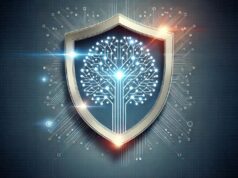The head of the National Cyber Security Centre has warned that a major cyber-attack is a matter of “when, not if”.
Ciaran Martin said the UK has so far avoided a category one attack, defined as an attack that might cripple infrastructure. During an hour-long interview with the Guardian, Martin said he anticipated such an attack in the next two years.
“I think it is a matter of when, not if and we will be fortunate to come to the end of the decade without having to trigger a category one attack.
Most comparable western countries have experienced what we would consider a category one attack so we have been fortunate in avoiding that to date.
What we have seen over the past year or so is a shift in North Korean attack motivation from what you might call statecraft – disrupting infrastructure – through to trying to get money through attacks on banks but also the deployment of ransomware, albeit in a way that didn’t pan out in the way the attackers wanted to.”
The last major attack was the WannaCry ransomware that crippled NHS, this was a category two attack. Similarities were spotted between this cyber-attack and code used by a group with links to the North Korean government say Kaspersky and Symantec.
The companies said that technical details within an early version of the WannaCry code are similar to code used by the government-linked North Korean hackers, Lazarus Group.
The attack that hit the NHS brought to light a global ransomware infection, hitting 75,000 computers in 99 countries, demanding ransom payments in 20 languages.
Ransomware is computer malware that installs covertly on a victim’s device that either mounts the cryptoviral extortion attack from cryptovirology that holds the victim’s data hostage, or mounts a cryptovirology leakware attack that threatens to publish the victim’s data, until a ransom is paid.









This is a new terror using technology. If man invents new systems there is always the downside of exploitation from sex, to international cyber attacks on World commerce. Killing innocent people by cyber is now a reality, and could result in thousands if not millions of lives in the long term.
Maybe, the only way to respond is to develop more sophisticated firewalls for defence, and create offensive cyber systems to take out the attackers? A major cyber hit on any society is an act of war, if it results in deaths. Where the nuclear club is modest membership and has proved to be an effective mutual deterrent, a cyber attack can be generated from anywhere, even a backwater country. In some ways, a cyber attack is the equivalent of a dirty bomb, in terms of it being a less costly delivery into the heart of our lives. Currently, cyber attacks are a critical threat to World peace, and some serious work is needed to ensure such activity is quickly curtailed, before it all turns foul.
i honestly think that netflix going down for an hour, or your tv going haywire for a day, or a blocked mobile is not as big a problem as they make out – another excuse to make money for cyber services
are you really that thick or are you joking? If you’re joking then sorry, but otherwise you realise that cyber attacks can affect more than just household accessories like Netflix right? They have already attacked the N.H.S systems which could have resulted in deaths. Cyber attacks can target any part of infrastructure including air traffic control, nuclear power stations, and traffic lights. Please read and actually understand the topic before you write a mindbogglingly dumb comment.
“a matter of “when, not if—
No, it’s a matter of when it’s triggered, not when it comes here – it’s here already.
Agree
We desperately need our own large cyber force and these people need to be embedded into a single force structure.
The thing that this post misses – is that everything is now integrated, there isn’t a real need for separate forces for air, land, sea and cyber as ultimately our enemies will use a combination of all to implement their plans.
Russia and China are leading the way here in how to maximise the value of integrating the whole force and it is just a matter of time and I fear the UK is woefully under prepared (but could be wrong).
Cyber is the new Blitzkrieg – it has elevated the use of technology to have a far greater impact when working alongside more conventional means than the components on their own.
The UK Armed Forces got hit previously by Confiker which was a major wake up call. As with anything the after action debrief meant we learn t a lot about the fragility of systems, cross system infection and how the loss of apparently inconsequential admin systems had unforeseen effects on operational capability. Those lessons learnt have been applied to the IT systems.
On the plus side I had no email for over a week…which meant I could GOYA ( Get off your Arse) and walk the patch and talk to people instead of having to answer pointless emails. The loss of admin systems meant everything went old school again…Writing (yes writing with a pen) memos and briefs, snowpace on old forms and photo copying them,… it was actually quite refreshing until they patched the systems and gave them the all clear…then the worlds supply of emails arrived in my inbox and it was back to reality.
No real news here its already happened with the NHS last year and there is a constant barrage of these attacks against our world class financial services industry.
It will happen because it already has several times – my guess is that the code is already dormant from a previous insertion potentially 20 years ago or more, just waiting to be activated, and until it is its very difficult (but not impossible) to find and eradicate false code.
time will tell but this is not particularly new – its the modern day version of enigma with equally critical outcomes.
The chain is only as strong as the weakest link and with so much infrastructure and public services such as power, water, transport, health, telecoms etc in private hands it is difficult for HMG/GCHQ to harden everything. The weakest links, and sadly there will be many, are probably to be found in places like a hospital not being able to afford to update its computer systems (e.g. the 2017 NHS “attack†– in quotes because they don’t think it was specifically targeted at the NHS or even the UK) or some idiot employee in some critical private company somewhere clicking on a “run this program to win a million quid†executable attached to a phishing email.
I suspect that, as with all weapons and methods of warfare, there is a fair amount of respect and uncertainty in China, Russia and elsewhere for and about the capabilities of the Western countries to respond in kind to a serious cyber attack. I hope so anyway!
the majority of armchair viewers here have little or no understanding about how computers, operating systems, red/black networks etc work. The armed forces are well protected, the average domestic user/punter and loony public organisations like the NHS, are still in the fog about computers, I would suggest the hidden microsoft anti-virus command to be used “format c:” that should fix it nicely!